2004 年 6 月英语六级真题及答案
Part I Listening Comprehension (20 minutes)
Section A
Directions: Inthissection,youwillhear10shortconversations.Attheendofeach
conversation, a question will be asked about what was said. Both the
conversationandthequestionwillbespokenonlyonce.Aftereachquestion
the re will be a pause. During the pause, you must read the four choices
marked A), B), C) and D), and decide which is the best answer. Then mark
thecorrespondingletterontheAnswerSheetwithasinglelinethroughthe
centre.
Example:
You will hear:
You will read:
A) 2 hours.
B) 3 hours.
C) 4 hours.
D) 5 hours.
From the conversation we know that the two are talking about some work they will
start at 9 o’clock in the morning and have to finish by 2 in the afternoon. Therefore,
D) “5 hours” is the correct answer. You should choose [D] on the Answer Sheet and
mark it with a single line through the centre.
Sample Answer [A] [B] [C] [D]
1.
A) Dick has bad taste in clothes.
B) The color of Dick’s jacket is too dark.
C) Dick’s trousers don’t match his jacket.
D) Dick looks funny in that yellow jacket.
2.
A) Get the wallet for the man.
B) Call the police station.
C) Show the man her family pictures.
D) Ask to see the man’s driver’s license.
3.
A) She is afraid the new epidemic SARS will soon spread all over town.
B) The temperature is not as high as the man claims.
C) The room will get cool if the man opens the windows.
�
D) She is following instructions not to use the air-conditioning.
4.
A) She was never persistent in anything she did.
B) She had a unique way of staying healthy.
C) She stopped exercising two years ago.
D) She lost a lot of weight in two years.
5.
A) The application arrived a week earlier than expected.
B) The job has been given to someone else.
C) The man is not suitable for the position,
D) She had received only one application letter.
6.
A) He thinks his mother should get the clothes back.
B) He will go before the laundry is closed.
C) He’s unwilling to fetch the laundry.
D) He has already picked up the laundry.
7.
A) At an international trade fair.
B) At an electronics company.
C) At a DVD counter in a music store.
D) At a shopping center.
8.
A) The woman regrets going to the movie.
B) The woman prefers light movies before sleep.
C) The woman saw a comedy instead of a horror movie.
D) The woman hated the man talking throughout the movie.
9.
A) He is a man with professional expertise.
B) He is not likely to get the job.
C) He is not easy to get along with.
D) He is the fight man to get the job done.
10. A) It is a very good place to relax.
B) It should revolutionize its technology.
C) It should change its concept of operation.
D) It is being forced out of the entertainment industry.
Section B
Directions: Inthissection,youwillhear3shortpassages.Attheendofeachpassage,
�
you will hear some questions. Both the passage and the questions will be
spokenonlyonce.Afteryouhearaquestion,youmustchoosethebestanswer
fromthefourchoicemarkedA),B),C)andD).Thenmarkthecorresponding
letter on the Answer Sheet with a single line through the centre.
Passage One
Questions 11 to 13 are based on the passage you have just heard.
11. A) He was the most distinguished diplomat in American history.
B) He set up the first university in America.
C) He was one of the earliest settlers in America.
D) He can best represent the spirit of early America.
12. A) He represented Washington in negotiations with Britain.
B) He provided Washington with a lot of money.
C) He persuaded France to support Washington.
D) He served as a general in Washington’s army.
13. A) As one of the founding fathers of the United States.
B) As one of the greatest American scholars.
C) As one of America’s most ingenious inventors.
D) As one of the most famous activists for human rights.
Questions 14 to 17 are based on the passage you have just heard.
Passage Two
14. A) Because we might meet many successful executives in the media industry.
B) Because we might be offered a dish of insects.
C) Because nothing but freshly cooked insects are served.
D) Because some yuppies like to horrify guests with insects as food.
15. A) On the Internet.
B) In the supermarket.
C) In the seafood market.
D) From yuppie clubs.
16. A) It’s safe to eat.
B) It’s easy to prepare.
C) It’s exotic in appearance.
�
D) It’s tasty and healthful.
17. A) It is unlikely to be enjoyed by most People.
B) It will have to be changed to suit local tastes.
C) It will become the first course at dinner parties.
D) It will be consumed by more and more young people.
Questions 18 to 20 are based on the passage you have just heard.
Passage Three
18. A) They don’t have enough service windows.
B) Their business hours are limited.,,
C) Their safety measures are inadequate.
D) Their banking procedures are complicated.
19. A) People who have computers at home.
B) Young people who are fond of modern technology.
C) Young people who are wealthy and well-educated.
D) People who are in the habit of switching from one bank to another.
20. A) To provide services for distant clients.
B) To compete for customers.
C) To reduce the size of their staff.
D) To expand their operations at a lower cost.
Part II Reading Comprehension (35 minutes)
Directions: There tire 4 passages in this part. Each passage is followed by some
questionsorunfinishedstatements.Foreachofthemtherearefourchoices
markedA),B),C)andD).Youshoulddecideonthebestchoiceandmarkthe
corresponding letter on the, Answer Sheet with a single line through the
centre.
Passage One
Questions 21 to 25 are based on the following passage.
Given the lack of fit between gifted students and their schools, it is not surprising
that such students often have little good to say ‘about their school experience. In
one study of 400 adults who had achieved distinction in all areas of life, researchers
found that three-fifths of these individuals either did badly in school or were unhappy
in school. Few MacArthur Prize fellows, winners of the MacArthur Award for creative
�
accomplishment, had good things to say about their precollegiate schooling if they had
not been placed in advanced programs. Anecdotal(名人轶事) reports support this. Pablo
Picasso, Charles Darwin, Mark Twain, Oliver Goldsmith, and William Butler Yeats all
disliked school. So did Winston Churchill, who almost failed out of Harrow, an elite
British school. About Oliver Goldsmith, one of his teachers remarked, “Never was so
dull a boy.” Often these children realize that they know more than their teachers,
and their teachers often feel that these children are arrogant, inattentive, or
unmotivated.
Some of these gifted people may have done poorly in school because their gifts were
not scholastic. Maybe we can account for Picasso in this way. But most fared poorly
in school not because they lacked ability but because they found school unchallenging
and consequently lost interest. Yeats described the lack of fit between his mind and
school: “Because I had found it difficult to attend to anything less interesting than
my own thoughts, I was difficult to teach.” As noted earlier, gifted children of all
kinds tend to be strong-willed nonconformists. Nonconformity and stubbornness (and
Yeats’s level of arrogance and self-absorption) are likely to lead to Conflicts with
teachers.
When highly gifted students in any domain talk about what was important to the
development of their abilities, they are far more likely to mention their families than
their schools or teachers. A writing prodigy (神童) studied by David Feldman and Lynn
Goldsmith was taught far more about writing by his journalist father than his English
teacher. High-IQ children, in Australia studied by Miraca Gross had much more positive
feelings about their families than their schools. About half of the mathematicians
studied by Benjamin Bloom had little good to say about school. They all did well in
school and took honors classes when available, and some skipped grades.
21. The main point the author is making about schools is that ________.
A) they should enroll as many gifted students as possible
B) they should organize their classes according to the students’ ability
C) they are often incapable of catering to the needs of talented students
D) they should satisfy the needs of students from different family backgrounds
22. The author quotes the remarks of one of Oliver Goldsmith’s teachers ________.
A) to show how poor Oliver’s performance was at school
B) to illustrate the strong will of some gifted children
C) to explain how dull students can also be successful
D) to provide support for his argument
23. Pablo Picasso is listed among the many gifted children who ________.
A) could not cope with their studies at school successfully
B) paid no attention to their teachers in class
�
C) contradicted their teachers much too often
D) behaved arrogantly and stubbornly in the presence of their teachers
24. Many gifted people attributed their success ________.
A) less to their systematic education than to their talent
B) mainly to parental help and their education at home
C) both to school instruction and to their parents’ coaching
D) more to their parents’ encouragement than to school training
25. The root cause of many gifted students having bad memories of their school years
is that ________.
A) they were seldom praised by their teachers
B) school courses failed to inspire or motivate them
C) their nonconformity brought them a lot of trouble
D) teachers were usually far stricter than their parents
Passage Two
Questions 26 to 30 are based on the following passage.
It’s hardly news that the immigration system is a mess. Foreign nationals have
long been slipping across the border with fake papers, and visitors who arrive in the
U.S. legitimately often overstay their legal welcome without being punished. But since
Sept. 11, it’s become clear that terrorists have been shrewdly factoring the weaknesses
of our system into their plans. In addition to their mastery of forging passports, at
least three of the 19 Sept. 11 hijackers (劫机者) were here on expired visas. That’s
been a safe bet until now. The Immigration and Naturalization Service (INS) (移民归
化 局 ) lacks the resources, and apparently the inclination, to keep track of the
estimated 2 million foreigners who have intentionally overstayed their welcome.
But this laxness(马虎) toward immigration fraud may be about to change. Congress
has already taken some modest steps. The U.S.A. Patriot Act, passed in the wake of the
Sept. 11 tragedy, requires the FBI, the Justice Department, the State Department and
the INS to share more data, which will make it easier to stop watch-listed terrorists
at the border.
But what’s really needed, critics say, is even tougher laws and more resources
aimed at tightening up border security. Reformers are calling for a rollback of rules
that hinder law enforcement. They also want the INS to hire hundreds more border patrol
agents and investigators to keep illegal immigrants out and to track them down once
they’re here. Reformers also want to see the INS set up a database to monitor whether
visa holders actually leave the country when they are required to.
All these proposed changes were part of a new border-security bill that passed the
House of Representatives but died in the Senate last week. Before Sept. 11, legislation
�
of this kind had been blocked by two powerful lobbies: universities, which rely on
tuition from foreign students who could be kept out by the new law, and business, which
relies on foreigners for cheap labor. Since the attacks, they’ve backed off. The bill
would have passed this time but for congressional maneuverings and is expected to be
reintroduced and to pass next year.
Also on the agenda for next year: a proposal, backed by some influential law-makers,
to split the INS into two agencies-a good cop that would tend to service functions like
processing citizenship papers and a bad cop that would concentrate on border inspections,
deportation and other functions. One reason for the division, supporters say, is that
the INS has in recent years become too focused on serving tourists and immigrants. After
the Sept, 11 tragedy, the INS should pay more attention to serving the millions of
ordinary Americans who rely on the nation’s border security to protect them from
terrorist attacks.
26. Terrorists have obviously taken advantage of ________.
A) the irresponsibility of the officials at border checkpoints
B) the legal privileges granted to foreigners
C) the excessive hospitality of the American people
D) the low efficiency of the Immigration and Naturalization Service
27. We learn from the passage that coordinated efforts will be made by various U.S.
government agencies to ________.
A) limit the number Of immigrants to the U.S.
B) prevent the forgery of immigration papers
C) ward off terrorist suspects at the border
D) refuse the renewing of expired visas
28. It can be inferred from the passage that before Sept. 11, aliens with expired visas
________.
A) might stay on for as long as [hey wished
B) would be closely watched by FBI agents
C) would live in constant fear of deportation
D) might have them extended without trouble
29. It is believed by many that all these years the INS ________.
A) has been serving two contradictory functions
B) has ignored the pleas of the two powerful lobbies
C) has over-emphasized its service functions at the expense of the nation’s
security
D) has been too liberal in granting visas to tourists and immigrants
�
indiscriminately
30. Before Sept. 11, the U.S. Congress had been unable to pass stricter immigration
laws because ________.
A) education and business circles cared little about national security
B) resources were not available for their enforcement
C) it was difficult to coordinate the efforts of the congressmen
D) they might have kept away foreign students and cheap labor
Passage Three
Questions 31 to 35 are based on the following passage.
It was the worst tragedy in maritime (航海的) history, six times more deadly than
the Titanic. When the German cruise ship Wilhelm Gustloff was hit by torpedoes (鱼
雷) fired from a Russian submarine in the final winter of World War II, more than 10,000
people-mostly women, children and old people fleeing the final Red Army push into Nazi
Germany-were packed aboard. An ice storm had turned the decks into frozen sheets that
sent hundreds of families sliding into the sea as the ship tilted and began to go down.
Others desperately tried to put lifeboats down. Some who succeeded fought off those
in the water who had the strength to try to claw their way aboard. Most people froze
immediately. I’ll never forget the screams,” says Christa Ntitzmann, 87, one of the
1,200 survivors. She recalls watching the ship, brightly lit, slipping into its dark
grave-and into seeming nothingness, rarely mentioned for more than half a century.
Now Germany’s Nobel Prize-winning author Gtinter Grass has revived the memory of
the 9,000 dead, including more than 4,000 children-with his latest novel Crab Walk,
published last month. The book, which will be out in English next year, doesn’t dwell
on the sinking; its heroine is a pregnant young woman who survives the catastrophe only
to say later: “Nobody wanted to hear about it, not here in the West (of Germany) and
not at all in the East.” The reason was obvious. As Grass put it in a recent interview
with the weekly Die Woche: “Because the crimes we Germans are responsible for were
and are so dominant, we didn’t have the energy left to tell of our own sufferings.”
The long silence about the sinking of the Wilhelm Gustloff was probably
unavoidable-and necessary. By unreservedly owning up to their country’s monstrous
crimes in the Second World War, Germans have managed to win acceptance abroad,
marginalize (使…不得势) the neo-Nazis at home and make peace with their neighbors.
Today’s unified Germany is more prosperous and stable than at any time in its long,
troubled history. For that, a half century of willful forgetting about painful memories
like the German Titanic was perhaps a reasonable price to pay. But even the most
politically correct Germans believe that they’ ye now earned the right to discuss the
full historical record. Not to equate German suffering with that of its victims, but
simply to acknowledge a terrible tragedy.
31. Why does the author say the sinking of the Wilhelm Gustloff was the worst tragedy
�
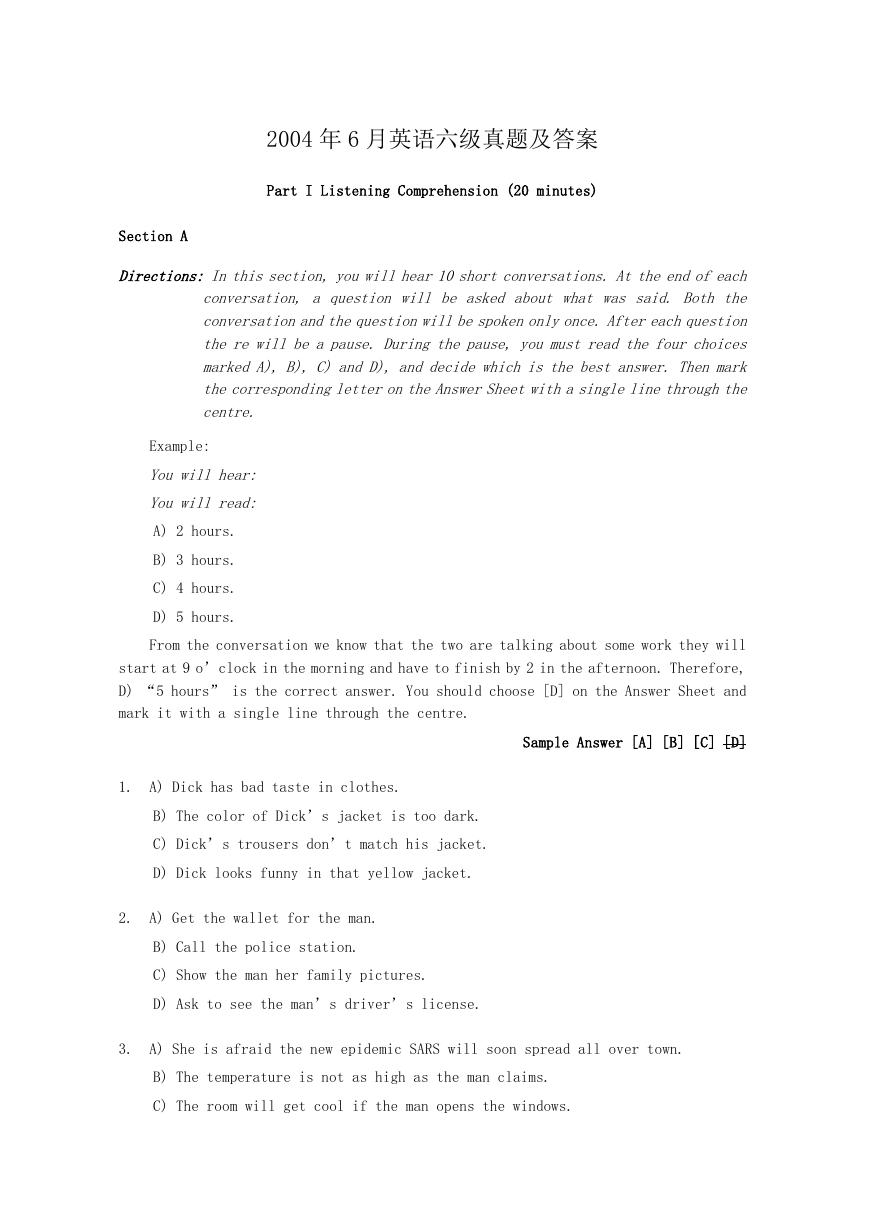


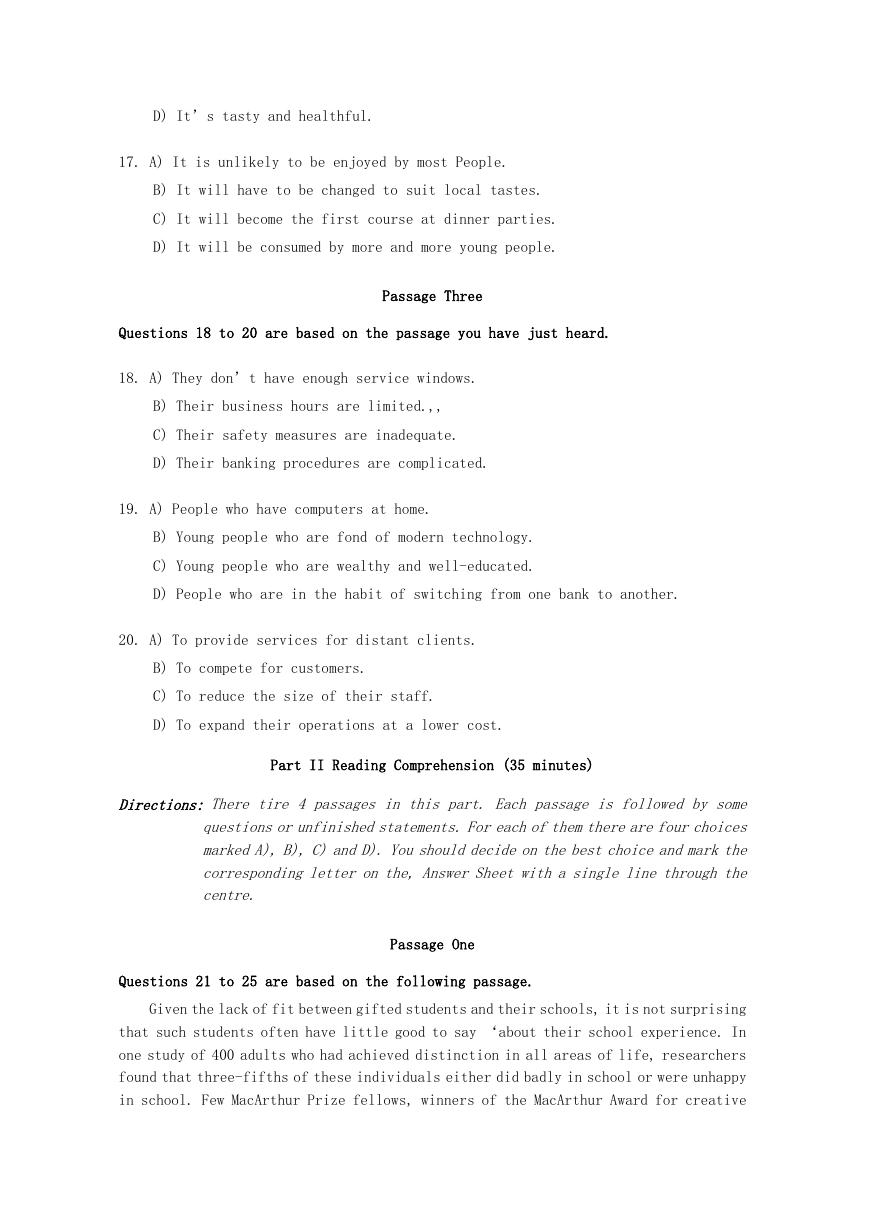
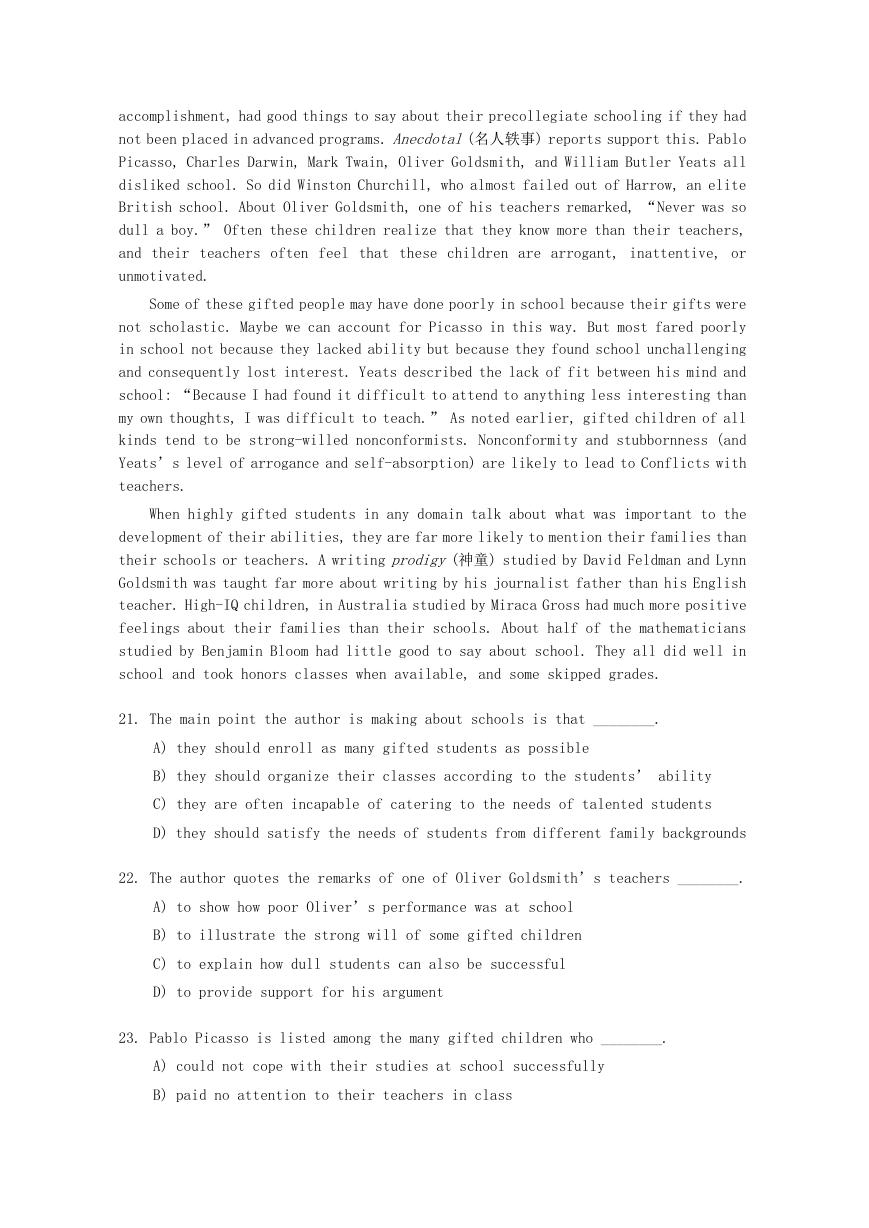
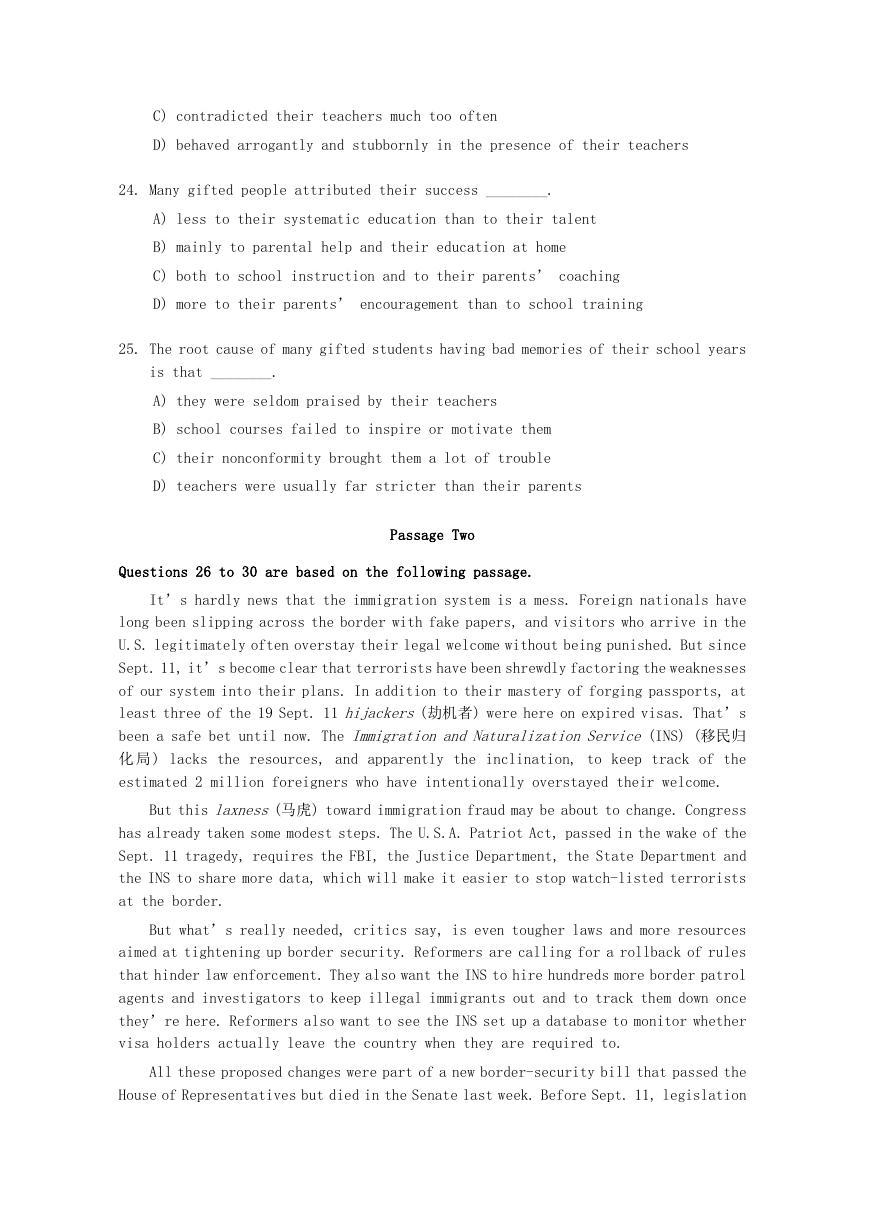
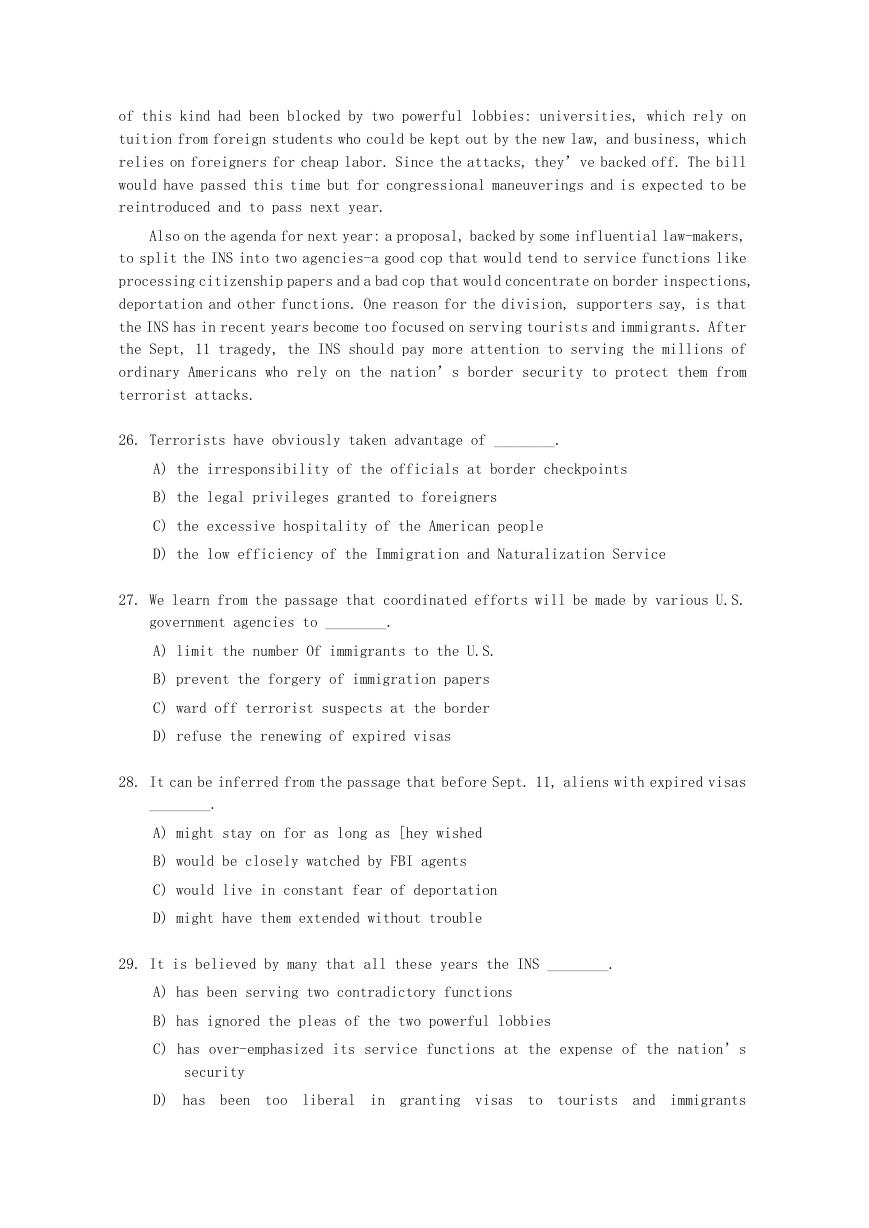
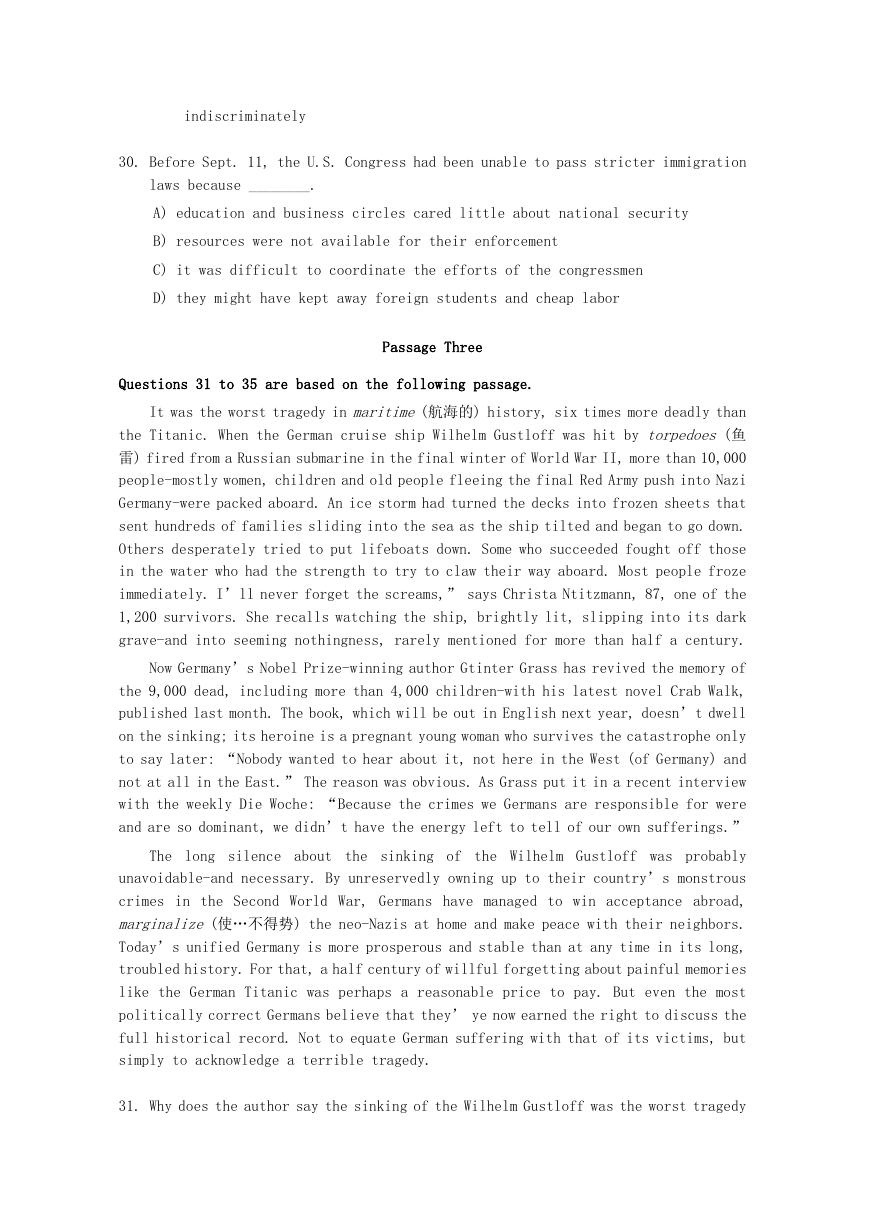








 2023年江西萍乡中考道德与法治真题及答案.doc
2023年江西萍乡中考道德与法治真题及答案.doc 2012年重庆南川中考生物真题及答案.doc
2012年重庆南川中考生物真题及答案.doc 2013年江西师范大学地理学综合及文艺理论基础考研真题.doc
2013年江西师范大学地理学综合及文艺理论基础考研真题.doc 2020年四川甘孜小升初语文真题及答案I卷.doc
2020年四川甘孜小升初语文真题及答案I卷.doc 2020年注册岩土工程师专业基础考试真题及答案.doc
2020年注册岩土工程师专业基础考试真题及答案.doc 2023-2024学年福建省厦门市九年级上学期数学月考试题及答案.doc
2023-2024学年福建省厦门市九年级上学期数学月考试题及答案.doc 2021-2022学年辽宁省沈阳市大东区九年级上学期语文期末试题及答案.doc
2021-2022学年辽宁省沈阳市大东区九年级上学期语文期末试题及答案.doc 2022-2023学年北京东城区初三第一学期物理期末试卷及答案.doc
2022-2023学年北京东城区初三第一学期物理期末试卷及答案.doc 2018上半年江西教师资格初中地理学科知识与教学能力真题及答案.doc
2018上半年江西教师资格初中地理学科知识与教学能力真题及答案.doc 2012年河北国家公务员申论考试真题及答案-省级.doc
2012年河北国家公务员申论考试真题及答案-省级.doc 2020-2021学年江苏省扬州市江都区邵樊片九年级上学期数学第一次质量检测试题及答案.doc
2020-2021学年江苏省扬州市江都区邵樊片九年级上学期数学第一次质量检测试题及答案.doc 2022下半年黑龙江教师资格证中学综合素质真题及答案.doc
2022下半年黑龙江教师资格证中学综合素质真题及答案.doc